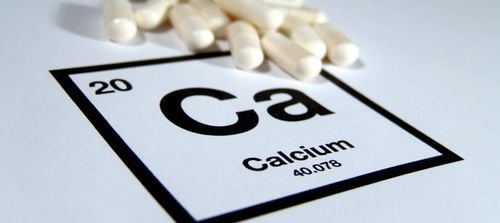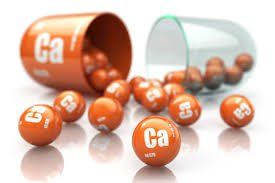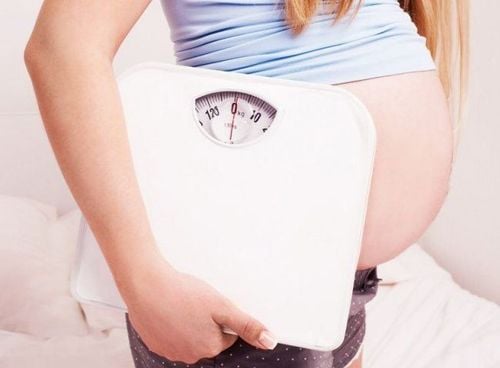This is an automatically translated article.
Most women will gain about 11.5 to 16 kg during pregnancy. The degree of weight gain depends on your condition. A healthy, nutrient-rich diet along with exercise is the basis for a healthy pregnancy.
1. Weight management during pregnancy
Some women were overweight when they were pregnant. Other women gain weight too quickly during pregnancy. Either way, pregnant women should not diet or try to lose weight during pregnancy.
To control weight gain during pregnancy, it is better to focus on eating the right foods and staying active. If you don't gain enough weight during pregnancy, you and your baby may have a number of problems. However, you can change your diet to get the nutrients you need without gaining too much weight. The corresponding calorie intake for each period of women during pregnancy, including:
In the first trimester, you need to ensure 1,800 calories per day Mid-cycle 3-month diet needs to ensure 2,200 calories per day diet in the last 3 months of pregnancy should ensure 2,400 calories per day 1.1 What causes weight gain during pregnancy? Much of the weight you gain during pregnancy is not due to fat but to the baby. Here is a breakdown of how 16kg is calculated:
Baby: 3.5 kg Placenta:1 to 1.5 kg Amniotic fluid : 1 to 1.5 kg Breast tissue:1 to 1.5 kg Provide blood: 2 kg Fat stores: 2.5 to 4 kg Uterine growth: 1 to 2.5 kg
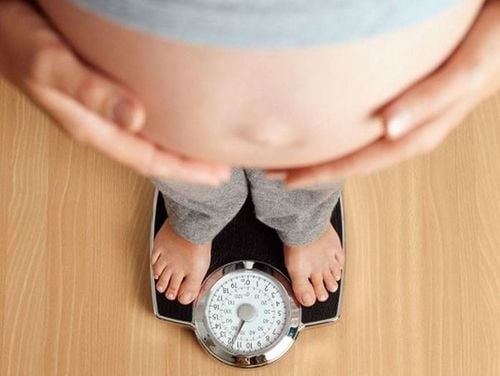
Một số chị em phụ nữ có thể gặp tình trạng tăng cân quá nhanh khi mang thai
2. How to follow a diet that doesn't gain too much weight during pregnancy
Pregnant women can follow a diet to not gain weight during pregnancy in the following way:
2.1. Healthy food choices Fresh fruits and vegetables are good snacks, packed with vitamins and low in calories and fat. Eat foods made from whole grains such as: breads, crackers, and whole grains. Choose reduced-fat dairy products. You need at least 4 servings of milk per day. However, using skim milk, 1% or 2% will significantly reduce the amount of calories and fat you eat. Also choose low-fat or fat-free cheese or yogurt. 2.2. Foods to Avoid During Pregnancy Natural sweeteners are better than foods and drinks with added sugar or artificial sweeteners. So read labels and watch out for drinks high in sugar. Replace soda water with fruit drinks. Avoid junk food, such as chips, candy, cakes, cookies, and ice cream. The best way to avoid eating unhealthy junk food or junk food is to not have these foods in the house. Reduce fat. Fats include cooking oil, margarine, butter, gravy, sauces, mayonnaise, regular salad dressings, lard, sour cream, and cream cheese. Try low-fat products rather than these.
3. Nutrients to use for a pregnancy diet
For a healthy pregnancy and balanced development for mother and baby, the following nutrients are included in the pregnancy diet itself.
Calcium: Calcium is needed in the body to build strong bones and teeth. Calcium also allows the blood to clot normally, the nerves to function properly, and the heart to beat normally. The American College of Obstetricians and Gynecologists (ACOG) recommends 1,000 milligrams (mg) per day for pregnant and nursing (breastfeeding) women. Women 19 and younger need 1,300 mg per day. Eat or drink 4 servings of dairy products or calcium-rich foods. Dairy products are believed to be the best sources of calcium. Other good sources of calcium are dark green vegetables, fortified cereals, breads, fish, fortified orange juice, almonds and sesame seeds.
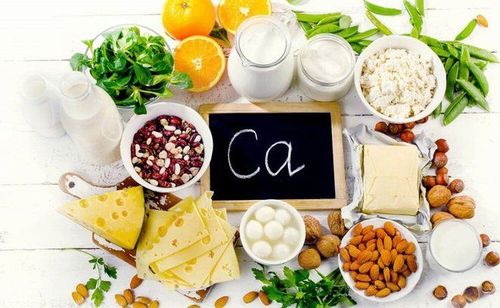
Canxi có trong một số loại thực phẩm sử dụng hàng ngày
Folic Acid: Folic acid is used to make the extra blood the body needs during pregnancy. The ACOG and March of Dimes recommend 400 micrograms (mcg) per day for pregnant women. This amount is included in your prenatal vitamin. The March of Dimes suggests that 70% of neural tube defects can be avoided with appropriate folic acid supplementation. Some women are at risk of having a baby with an open neural tube defect (including but not limited to women with a family history of spina bifida, women taking anti-seizure medications, etc.). ACOG recommends folic acid supplements for women at high risk for neural tube defects. Your doctor can discuss this with you and, in some cases, will refer you to genetic counseling for further discussion. Foods rich in folic acid include lentils, kidney beans, green leafy vegetables (spinach, romaine lettuce, kale and broccoli), citrus fruits, nuts, and beans. Folic acid is also added as a supplement to certain foods such as fortified breads, cereals, pasta, rice, and flour. Iron: Iron is an important part of red blood cells, which carry oxygen throughout the body. Iron will help you build resistance to stress and illness, as well as help you avoid fatigue, weakness, irritability and depression. ACOG recommends taking an iron supplement of 27mg per day between your food and your prenatal vitamin. Good sources include whole grain products, lean beef and pork, dried fruits and beans, sardines, and green leafy vegetables.
Vitamin A: ACOG recommends you get 770 mcg of Vitamin A per day. Foods rich in Vitamin A are green leafy vegetables, dark yellow or orange vegetables (e.g. carrots or sweet potatoes), milk, and liver. Daily recommendations: Include 2 to 3 servings of vegetables, 2 servings of fruit, at least 3 servings of whole grain breads, cereals, pasta, 2 to 3 servings of lean protein (e.g. meat, fish and poultry) . Vitamin D: Vitamin D works with calcium to help your baby's bones and teeth develop. It is also essential for healthy skin and vision. All women, including those who are pregnant, need 600 international units of vitamin D per day. Good sources are milk fortified with vitamin D and fatty fish like salmon. Exposure to sunlight also converts chemicals in the skin to vitamin D. DHA: The American College of Obstetricians and Gynecologists (ACOG) recommends that pregnant and breastfeeding women consume at least 200 mg of the acid on average. docosahexaenoic (DHA) daily along with prenatal vitamins. Prenatal vitamins, as well as DHA, can be purchased over-the-counter or by prescription. Protein: Protein is an important nutrient for growth and development. Protein is needed for energy and to build and repair various parts of the body, especially the brain, muscles and blood. Pregnant women need extra protein for the growth of the fetus. Each person needs different amounts of protein depending on their size. A woman weighing 68 kg needs 75 grams of protein per day. (For an estimate, use your pre-pregnancy weight and divide by 2) Choose a variety of protein-rich foods, including seafood, lean meat and poultry, eggs, beans and peas, and soy products, unsalted nuts and seeds. Use labels on packaged foods to determine how many grams of protein each food provides. Avoid alcohol: Alcohol has been linked to premature birth and low birth weight infants, as well as fetal alcohol syndrome. Caffeine: You should limit your caffeine intake. Eat salt in moderation: Salt causes your body to retain water and can lead to high blood pressure.

Phụ nữ mang thai nên hạn chế uống caffeine
In addition to maintaining a healthy diet, during pregnancy, pregnant women need to have regular antenatal check-ups, through the check-ups, the doctor will advise on the most suitable nutrition for the baby's health. fetal development in each stage.
In case pregnant women gain weight slowly or gain weight too quickly, it is best to see a doctor for an accurate diagnosis. Based on the fetal growth index, the doctor will assess whether the fetal status is affected.
Currently, to protect the health of mother and baby during pregnancy, Vinmec International General Hospital provides a full package of maternity services with the support of a team of medical staff and doctors. Signing up for a full service package helps mothers feel completely secure during pregnancy as well as commits to comprehensively supporting childbirth and newborn care.
Please dial HOTLINE for more information or register for an appointment HERE. Download MyVinmec app to make appointments faster and to manage your bookings easily.
References: medlineplus.gov - babycenter.com - my.clevelandclinic.org - healthline.com





